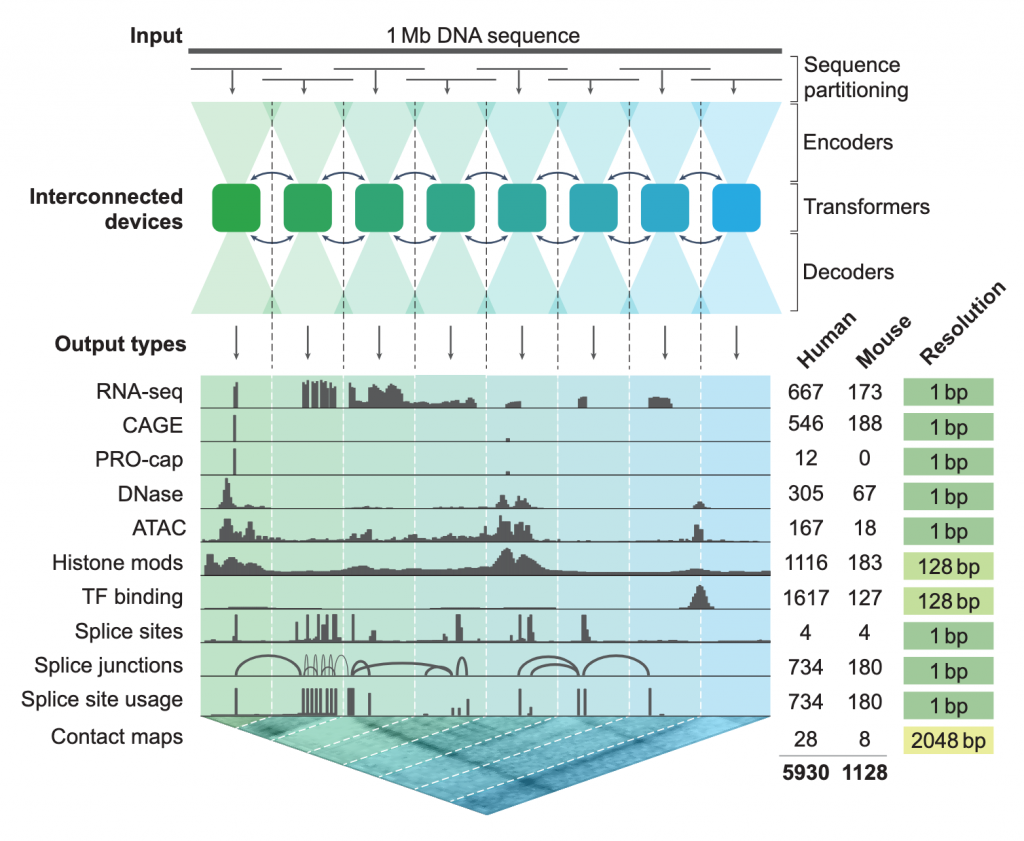A New Frontier for Deep Learning
Every decade or so, artificial intelligence reaches a frontier that expands what we think is computable. In 2023, DeepMind’s AlphaFold stunned the world by predicting protein structures. Now, two years later, AlphaGenome [1] may be just as transformative not just for biology, but for how businesses think about data, models, and complexity.
Unveiled by DeepMind in June 2025, AlphaGenome is a deep learning system that reads the human genome – a sequence of three billion base pairs – and predicts how changes in that code alter the machinery of life.
For companies that work with complex systems, from pharmaceuticals and healthcare to energy, finance, or manufacturing, AlphaGenome is a signpost: AI can now model multi-scale systems with astonishing precision.
What Makes AlphaGenome Different
The key challenge in genomics has always been non-coding DNA – the 98 percent of our genome that doesn’t make proteins but regulates everything that does. Until now, even the most advanced models could only see short fragments of DNA (around 10 000 bases) or only predict a few kinds of effects (like gene expression or splicing).
AlphaGenome breaks both limits.
- It processes 1 million bases (1 megabase) of DNA at a time — enough to see long-range interactions between genes and their regulatory regions.
- It predicts thousands of different “tracks” of biological activity, including gene expression, chromatin accessibility, histone modification, and transcription factor binding — all at single-base-pair resolution.
In practical terms: it’s like moving from a blurred satellite photo to a high-definition live map of the cell.
The technical advance lies in AlphaGenome’s architecture. It combines convolutional networks (to detect local DNA motifs) with transformers (to capture long-range relationships) in a U-Net-style framework. Using vast experimental data from human and mouse cells, DeepMind trained the model to learn how raw DNA sequence drives hundreds of biological processes simultaneously.
The results speak volumes. In benchmark evaluations:
- On single-sequence prediction tasks: it outperformed the best external model in 22 of 24 evaluations.
- On variant-effect prediction tasks: it matched or exceeded the strongest available external model in 24 of 26 evaluations.
- In a specific task measuring gene-level expression log-fold change (LFC) predictions, the model achieved a +17.4% relative improvement compared to a prior model.
For researchers, this means faster discovery of disease-related mutations. For industry, it’s proof that deep learning can handle multimodal, high-dimensional systems where interactions matter more than isolated variables.
Why CEOs Should Pay Attention
At Prometis Analytics, we see AlphaGenome as more than a breakthrough in biology – it’s a blueprint for the next generation of AI itself.
Unified Modelling: Instead of many specialised tools, AlphaGenome integrates multiple data types into one model.
Businesses sitting on fragmented data (operations, sensors, customer behaviour) can learn from this: the next productivity leap will come from unifying siloed systems into a single predictive framework.
Depth Over Data Volume: DeepMind trained AlphaGenome not by endlessly scaling data, but by using structured understanding – building relationships between modalities. The message for executives: it’s not just how much data you have, but how deeply you model the relationships inside it.
Explainability Through Simulation: AlphaGenome uses in silico mutagenesis – systematically changing one “input” base at a time to understand what drives an outcome. Imagine applying the same to your business: change one policy, price, or parameter, and predict the ripple effect. This is the future of scenario planning powered by AI.
The Business Implications Beyond Biotech
For pharmaceutical and biotech firms, the direct implications are clear:
- Faster identification of disease variants.
- Lower R&D cost by predicting lab results before running experiments.
- Tailored therapies through better understanding of individual genomes.
But the conceptual leap extends further.
For any enterprise operating complex networks – energy grids, supply chains, or financial markets – AlphaGenome shows how deep learning can become a “digital twin” of systems that were once too vast and nonlinear to simulate.
The techniques underpinning AlphaGenome – transformers, multimodal learning, hierarchical embeddings – are already appearing in business applications: predictive maintenance, logistics optimisation, even macro-economic modelling.
From Biology to the Boardroom
The AlphaGenome story is also a cultural one: AI is no longer just a digital tool; it’s becoming an epistemic partner – an engine for discovery itself.
For CEOs, the takeaway is simple yet profound: Your organisation’s data, no matter how messy or multi-layered, is potential knowledge. The frontier is not collecting more of it, but learning how to connect it.
DeepMind’s new model doesn’t just decode the genome; it shows what’s possible when machines start to understand systems rather than datasets.

AlphaGenome model overview – processes 1 million bases of DNA to predict thousands of biological signals across 11 modalities, bridging sequence, structure, and function. Source: DeepMind (2025) [2].
References
[1] https://www.nature.com/articles/d41586-025-01998-w
[2] https://storage.googleapis.com/deepmind-media/papers/alphagenome.pdf